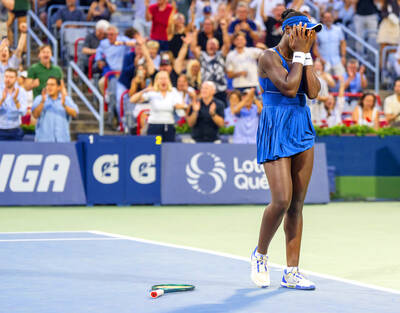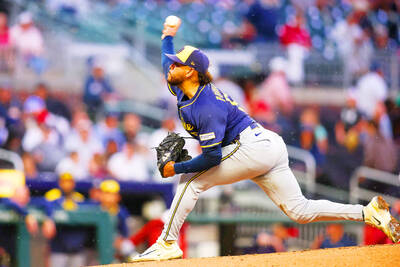A top European broadcast official says television coverage roadblocks in the run-up to the Beijing Olympics are a worrying sign for reporting freedom during the games.
Seven weeks before the Olympics open, television broadcasters are involved in a fight with Chinese organizers over coverage away from the sports venues. This involves moving satellite trucks around the city, deploying equipment and clear rules about where TV cameras will be able to film.
China’s communist government seems to fear that roving TV cameras and 30,000 journalists might show protests by political, ethnic or religious dissidents, or athletes and activists speaking out against China’s policies in Tibet or Darfur.
“What’s going on now might be an indication of what could happen during the games,” Fernando Pardo, head of sports for the European Broadcasting Union (EBU), said in a telephone interview on Friday. “If this happens during the Games, the reaction of broadcasters could be unpredictable.”
The president of the International Olympic Committee (IOC), Jacques Rogge, said on Thursday that Beijing organizers were close to resolving the issues.
“It will take a couple of days to finalize everything,” Rogge said in an interview. “Things are moving extremely well to resolve these issues.”
Pardo, who has covered every Olympics since the 1976 Montreal Games, said he has seen only limited progress since emergency meetings on May 29 and May 30 in Beijing with top IOC, TV and Beijing organizing officials.
“I would love to agree with Mr Rogge, but unfortunately I don’t see many signs to agree,” said Pardo, who said he was expressing the feelings of other TV executives involved in the Games. “There are dark clouds on the horizon that keep me from agreeing.”
“We saw big security problems in Moscow [1980], so this is not new for me,” Pardo said. “We have worked in communist regimes before. But here it is much more difficult than Moscow. We have been in very difficult situations on other occasions. Not everything has been rosy, but nothing like this occasion. We have only seven weeks before the Games and so many things are not settled.”
Pardo said next week was critical as broadcasters begin moving operations to Beijing. He said broadcasters could seek financial compensation from the local organizing committee if promises were not met.
“If by any chance, when we are there in the Olympics working and we cannot work freely and get services we need, this is the moment when we can ask for compensation,” Pardo said.
Beijing Olympic organizing officials could not be reached for comment, but have repeatedly promised reporters would be free to do their jobs and cover the Olympics as they have at previous Games.
“We will fulfill our commitment to offer an efficient and high standard of service to all media and learn from the successful experience of the 2004 Athens Olympic Games organizers,” organizing committee chairman Liu Qi was quoted as saying yesterday.
Liu, who is also Communist Party chief of Beijing, the capital’s most powerful politician, said organizers would follow a “zero refusal” policy for interview requests. However, he defined that as meaning only that “all requests for interviews would be replied to.”
The EBU is one of the major rights-holding broadcasters and will employ a staff of 4,500 during the Games. The union has 85 member broadcasters in TV and radio and covers Europe, North Africa and some countries formerly part of the Soviet Union.
Pardo said Chinese officials, who had previously said live coverage would be allowed from Tiananmen Square, were now offering a stand-up position for broadcasters in the iconic venue, but it was unclear who would be able to use it.
“We don’t know who can access it,” he said. “Will guests for interviews have access to this area? Is this purely a broadcast area, or is it open? I want to have the possibility to bring whoever I consider necessary to this area to be interviewed. We don’t know who has the right to access.”
He said an EBU member told him that a film crew recently was given access to the Great Wall, but was then asked to pay “an outrageous fee” to begin filming. Pardo said it was not clear who asked for the money.
“Once you get the authorization you should be absolutely sure you can film freely and not have any problems. But this has not been the case,” he said.
Non rights-holders face many of the same restrictions over where they will be allowed to set up satellite trucks and high-tech equipment.
“I’m seeing promises of progress, but I’m not seeing the progress,” said Sandy MacIntrye, director of news for AP Television News, a non-rights holder.
“I know the IOC is pushing them [the Chinese] to get this stuff done,” MacIntrye said. “They [the Chinese] have promised progress and we wait to see if they live up to the promises.”
Murray Needham, the general manager of sports at Television New Zealand, a rights holder, voiced similar concerns.
“Many of us knew in the back of our minds that a China-hosted Games could throw up some unique difficulties and so it has proved,” Needham said via e-mail. “The broadcasting fraternity holds its breath in nervous anticipation.”
Shaken by protests on international legs of the Olympic torch relay following the outbreak of deadly rioting in Tibet in March, China’s government seems to be backtracking on promises to let reporters work as they have at previous Olympics.
A law enacted 18 months ago gave reporters freedom to move around the country, although Tibet has been off limits. The law generally has worked, although reporting remains a problem in the provinces.
In recent months, the government has tightened visa rules, particularly targeting foreign students. The government fears many would side with activist groups if protests break out.
In a 273-page guide to coverage for the foreign press, the introduction says: “The Chinese government will honor its commitments in the bid process ... to provide quality and convenient services to the media in accordance with international practice and the successful experience from previous games, so as to satisfy the demands of the media covering the Olympic Games in China.”

Taiwan’s top women’s badminton doubles duo, Hsieh Pei-shan (謝沛珊) and Hung En-tzu (洪恩慈), achieved a straight-sets victory over Japan’s Kaho Osawa and Mayui Tanabe at the Badminton World Federation (BWF) Super 300 Macau Open on Sunday. The Taiwanese pair won the final 21-18, 21-12, marking the duo’s second title this year after their win at the BWF Super 300 Taipei Open in May. The match on Sunday was their first encounter with the Japanese duo, ranked No. 63 in the world. Hsieh and Hung, ranked No. 12, began the opening game well. Hung, who plays left-handed, performed strongly at both the net and the

Canadian teenager Victoria Mboko upset top-seeded Coco Gauff 6-1, 6-4 on Saturday night to reach the National Bank Open quarter-finals. “Your support was incredible,” Mboko told the crowd in French after a chorus of “Ole, Ole, Ole” chants echoed around the venue. “I’m really happy to win today ... It’s incredible. I’m so happy to beat such a great champion.” Gauff dropped to 2-3 since winning the French Open. She followed the major victory with opening losses in Berlin and Wimbledon, then overcame double-fault problems to win two three-set matches in Montreal. Gauff had five double-faults on Saturday after having 23 in

Jobe Bellingham on Tuesday admitted to having “anxieties” on following in brother Jude’s footsteps after joining Borussia Dortmund in the summer. Jobe Bellingham, 19, is two years younger than Jude Bellingham, who joined Real Madrid in 2023 after three years at Dortmund. A centerpiece of the England national team, Jude Bellingham has emerged as one of the best players in the world in recent seasons. The younger Jobe Bellingham joined Dortmund in June from Sunderland after their promotion to the English Premier League. He admitted he understood what the perception would be ahead of the move to Germany. “It’s something you do think about.

Before Tuesday’s 7-2 win at the Atlanta Braves, Milwaukee Brewers manager Pat Murphy suggested “most people couldn’t tell you five players on our team.” A look at the standings would indicate more Brewers players soon will be recognized by more fans. After all, it is difficult to overlook a team that not only continues to extend their lead in the National League Central, but also boasts the best record in the majors. “What we’re doing in here right now is special,” right-handed pitcher Freddy Peralta said after allowing only four hits and one run in five innings, while setting a career high with